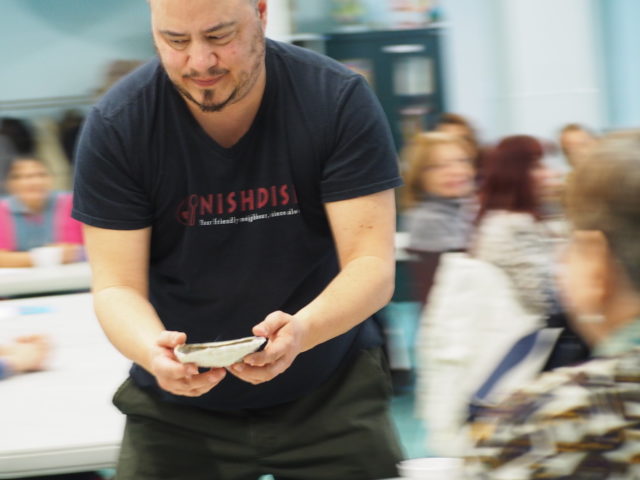This Indigenous Chef Is Serving Up Social Justice

A version of this article was published by Gastro Obscura. See the complete article here. The following is an outtake.
ON A RECENT afternoon, Johl Whiteduck Ringuette was holding forth at a Toronto community health center, addressing some 25 seniors about indigenous medicinal plants and foods. Among his many projects, giving talks such as this one occupies a substantial portion of his time. To the attentive audience, he broached the central conundrum of his work.
“What is indigenous food?” he asked. “Most of our people don’t even know.” He evoked historical Canadian laws that outlawed hunting, fishing and trapping, and that banned native languages and customs. “As a result, we don’t know what our culture is.”
As he recounted to the seniors, in the 19th century, indigenous people were often forcibly separated from traditional food sources, and non-native foodstuffs like flour, sugar and salt were introduced in their stead. He blames these European-introduced foods for the high level of heart disease and diabetes among aboriginal people, which the Public Health Agency of Canada characterizes as “epidemic.”
He advocates eating traditional foods to combat such health problems. “But how do you do that when traditional foods have been eradicated?”
Ringuette regularly faces this problem in his own catering and restaurant business. According to Canadian law, it is illegal to serve wild game in a restaurant; it must be farmed. The white corn Ringuette uses in his Three Sisters Stew (the “three sisters” are corn, beans and squash) and corn soup comes from the sole commercial provider in the area, Bonnie Skye, on the Six Nations of the Grand River, the largest First Nations reserve in Canada. Every six weeks a NishDish employee has to drive the hour and a half southwest of Toronto to pick up food supplies before storing it in a commercial walk in freezer.
Toronto is traditionally a wild rice territory. But today, Ringuette has to get deliveries from Flying Wild Rice, an indigenous grower 2,000 kilometers (1,240 miles) northwest of Toronto. Used in both sweet and savory NishDish offerings, like wild rice casserole, duck and wild rice soup, and wild rice-wild blueberry pudding, the rice is grown on a remote fly-in, spring-sourced lake. When supply runs out, Ringuette admits that he has been forced to buy wild rice at the commercial chain Bulk Barn, which does not offer the same quality product.
“You can see that’s not a sustainable or sovereign food line,” he said.
To address these concerns, Ringuette founded a series of interlacing businesses and not-for-profits. In addition to his restaurant NishDish (recently closed during the Covid-19 crisis), Ringuette created the Ojibiikaan Indigenous Cultural Network, a not-for-profit dedicated to indigenous food sovereignty in the Greater Toronto area. Among other initiatives, it plants indigenous gardens, such as Three Sisters gardens (corn, beans and squash mutually support one another, like a community). He is researching how, through partnerships with private land owners and universities, he might bring white corn and wild rice farming to the Toronto area. His Red Urban Nation Artist Collective has festooned a Toronto school board complex with murals, a site that hosts the occasional Indigenous Harvesters and Artisans Market, events that he hopes will become more regular.
Ringuette has targeted this complex, its land and the public Christie Pits Park across the street as the hub of perhaps his most ambitious project, spearheaded by another one of his not-for-profit groups, the Toronto Indigenous Business Association. In an area west of Koreatown, where NishDish is located, Ringuette envisions creating what he is calling the Anishinaabe Village District, a neighborhood where indigenous people could find resources of all kinds, including businesses, libraries and social services. In the near future, he is hoping, by procuring an investor, to open an expanded NishDish Restaurant and Marketeria in this envisioned district. Through outreach to other local community groups, grant applications, and projects like the murals and community gardens, he is gradually making progress toward these goals.
He acknowledges, though, that fulfilling his all-encompassing mission will not be easy. As he told the seniors at the health center, “In our teachings I’m responsible for the next seven generations.” Indeed, he sees that establishing sovereign food lines will take generations — which only spurs him on: “Someone has to start doing something now.”
In the fight for 15 years to date, he is ready to devote a lifetime to it — but humbly. “I’m not an elder,” he told the roomful of elderly Canadians. “I’m just a regular person learning my own culture.”
Forced to close during the health crisis, Nishdish initiated a GoFundMe campaign: https://bit.ly/3gefw6Z
